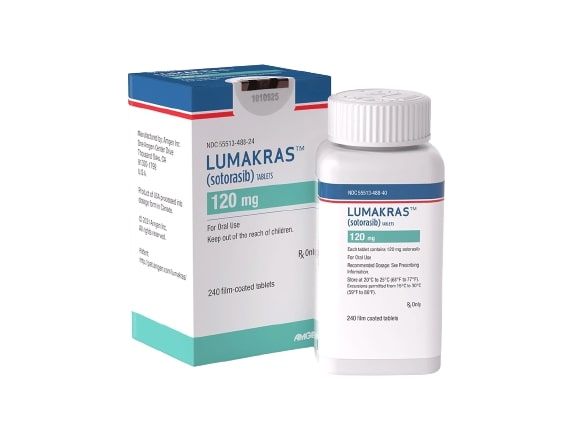Keytruda (pembrolizumab) vs Lumakras (sotorasib)
Keytruda (pembrolizumab) vs Lumakras (sotorasib)
Keytruda (pembrolizumab) is an immunotherapy drug that works by blocking the PD-1 pathway, which helps the immune system detect and fight cancer cells, and is commonly used to treat various types of cancers, including melanoma, lung cancer, and head and neck cancer. Lumakras (sotorasib) specifically targets the KRAS G12C mutation in cancer cells, a mutation found in a subset of non-small cell lung cancers (NSCLC), and is designed to inhibit the growth of tumors with this particular genetic feature. The choice between Keytruda and Lumakras would depend on the patient's specific type of cancer, its genetic makeup, and the overall health and treatment goals of the patient, as determined by their healthcare provider.
Difference between Keytruda and Lumakras
| Metric | Keytruda (pembrolizumab) | Lumakras (sotorasib) |
|---|---|---|
| Generic name | Pembrolizumab | Sotorasib |
| Indications | Various types of cancers including melanoma, lung cancer, head and neck cancer, Hodgkin lymphoma, and others | Non-small cell lung cancer (NSCLC) with KRAS G12C mutation |
| Mechanism of action | Programmed death receptor-1 (PD-1) blocking antibody | KRAS G12C inhibitor |
| Brand names | Keytruda | Lumakras |
| Administrative route | Intravenous infusion | Oral |
| Side effects | Fatigue, musculoskeletal pain, decreased appetite, pruritus, diarrhea, nausea, rash, fever, cough, dyspnea, constipation, pain, and abdominal pain | Diarrhea, musculoskeletal pain, nausea, fatigue, liver damage, cough, and shortness of breath |
| Contraindications | Patients with severe hypersensitivity to pembrolizumab or any of its excipients | Patients with severe hypersensitivity to sotorasib or any of its excipients |
| Drug class | Anti-PD-1 monoclonal antibody | KRAS G12C inhibitor |
| Manufacturer | Merck & Co. | Amgen Inc. |
Efficacy
Keytruda (Pembrolizumab) Efficacy in Lung Cancer
Keytruda, also known as pembrolizumab, is a highly effective immunotherapy drug used in the treatment of various forms of cancer, including lung cancer. Specifically, Keytruda has shown significant efficacy in the treatment of non-small cell lung cancer (NSCLC), which is the most common type of lung cancer. It works by targeting the PD-1 pathway, which is a mechanism that tumors use to evade the immune system. By blocking this pathway, Keytruda enables the immune system to better recognize and destroy cancer cells. Clinical trials have demonstrated that Keytruda can improve overall survival rates and reduce the risk of cancer progression or death when compared to traditional chemotherapy regimens.
Lumakras (Sotorasib) Efficacy in Lung Cancer
Lumakras, known generically as sotorasib, represents a newer class of targeted therapy that has shown effectiveness in treating lung cancer. It is specifically indicated for the treatment of NSCLC with a particular genetic mutation known as KRAS G12C. This mutation has historically been considered "undruggable" due to its challenging nature. However, Lumakras works by selectively targeting and inhibiting the KRAS G12C protein, thereby inhibiting tumor cell growth and survival. In clinical studies, Lumakras has demonstrated a significant response rate in patients with KRAS G12C-mutated NSCLC, offering a promising treatment option for this subset of patients who previously had limited targeted therapy options.
Combination Therapy and Treatment Selection
While both Keytruda and Lumakras are effective in their respective domains within lung cancer treatment, the choice of therapy often depends on the specific genetic makeup of the tumor, the overall health of the patient, and the stage of the cancer. Keytruda is commonly used as a first-line treatment for advanced NSCLC, especially in tumors that express high levels of PD-L1 or in combination with chemotherapy. On the other hand, Lumakras is used in cases where the NSCLC harbors the KRAS G12C mutation, which is present in a subset of patients. As research progresses, the potential for combination therapies involving drugs like Keytruda and Lumakras is also being explored to enhance treatment efficacy.
Conclusion
In conclusion, both Keytruda and Lumakras have brought significant advancements in the treatment of lung cancer. Keytruda's role in harnessing the body's immune response to fight cancer and Lumakras's targeted approach against the KRAS G12C mutation exemplify the progress in personalized medicine and targeted therapy. The efficacy of these drugs in improving patient outcomes has been validated through rigorous clinical trials, making them important options in the oncologist's arsenal against lung cancer. Ongoing research and clinical trials continue to refine their use and explore their full potential in combination with other therapies.
Regulatory Agency Approvals
Keytruda
-
European Medical Agency (EMA), European Union

-
Food and Drug Administration (FDA), USA

-
Health Canada

-
Therapeutic Goods Administration (TGA), Australia

-
Medsafe (NZ)

Lumakras
-
European Medical Agency (EMA), European Union

-
Food and Drug Administration (FDA), USA

-
Medicines & Healthcare products Regulatory Agency (MHRA), United Kingdom

Access Keytruda or Lumakras today
If Keytruda or Lumakras are not approved or available in your country (e.g. due to supply issues), you can access them via Everyone.org.
How it works

Make an enquiry
Choose the medicine you want to buy, answer a couple of questions, and upload your prescription to speed things up. We’ll get back to you within 24 hours.


Make an enquiry
Choose the medicine you want to buy, answer a couple of questions, and upload your prescription to speed things up. We’ll get back to you within 24 hours.


Breeze through the paperwork
We'll guide you through the required documents for importing unapproved medicine, ensuring you have all the necessary information.


Get a personalized quote
We’ll prepare a quote for you, including medicine costs and any shipping, administrative, or import fees that may apply.


Receive your medicine
Accept the quote and we’ll handle the rest - sourcing and safely delivering your medicine.

Some text on this page has been automatically generated. Speak to your physician before you start a new treatment or medication.
Let's talk
If you have any questions, call us or send us a message through WhatsApp or email:
Contact us




